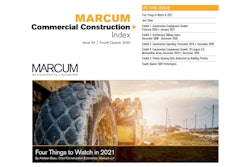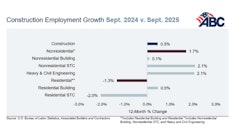
As the construction industry moves to slowly recover from the pandemic-related disruptions experienced last year, the lingering effects of these setbacks will continue to unsettle the industry's workforce for much of 2021. Many of the large-scale infrastructure and industrial projects delayed in 2020 will gradually get back online, and construction firms forced to downsize during the downturn will look to re-staff teams in order to adequately complete projects and make up for lost time.
This year, expect to see more workforce challenges for an industry already struggling with labor shortages. Where there is construction growth, there will be significant difficulties in meeting the demand for workers.
Here is a look at what's ahead in 2021 for each of the industry's key segments in terms of hiring.
Residential
As more companies adopt permanent work from home policies, the decreased need to live near city centers will drive strong growth in residential construction and hiring with both national and regional builders, particularly in technology markets around Southern California, Austin, Orlando, Atlanta, and Raleigh. Continued growth in home improvement projects will also positively impact the equipment, subcontracting and renovation communities along with building materials companies that supply basic product.
Overall, look for an uptick in demand for roles such as construction field managers, land development managers and sales reps.
Infrastructure
With infrastructure projects on an upward trajectory before the pandemic, Biden administration policies should further accelerate segment growth. While many of the major air and rail transportation and water infrastructure projects that were started but delayed last year are now back on track, the true backlog will result from projects slated to begin in 2020 but not yet started. Once funded, there will be an increase in rail and other sophisticated transportation projects that will have a significant positive impact on the economy.
During the first half of 2021, the focus will be on workers who can be directly assigned to projects and hit the ground running. By June/July, expect to see companies adding bench strength for civil engineers, project managers, field superintendents, and heavy equipment operators as projects become fully staffed and visibility into project pipelines improves.
Industrial
Experiencing only a brief COVID-19-driven pause, this sector is now struggling to keep up with demand from technology, semiconductor and electronic manufacturing companies for critical data center construction. As America becomes more digitally based, expect to see a surge in demand for specialized installation project managers and technicians; and HVAC, mechanical, electrical and plumbing trades.
The growth of utility scale solar projects will also impact labor in 2021. Drawing from the same tight labor pool as the industrial technology construction markets, it is likely that solar companies will need to seek talent from outside the sector to accommodate growth.
Commercial
More Americans are working from home now and for the foreseeable future. Although we should start seeing the completion of projects that were underway in 2020, the rate of growth in new office projects will be inconsequential as major metropolitan markets become saturated with under-utilized office space.
Another segment expected to lag in new development is hospitality. Development firms that planned for large hospitality projects will likely be delayed until late 2021, and unlikely to evaluate new projects until COVID-19 is fully behind us.
Conversely, newly formed habits like ordering even basic essentials online will likely stick, and continue to drive growth in warehousing. However, as the vaccine rollout gains more momentum and additional states begin to roll back COVID-19 business restrictions, expect to see a surge in retail construction and related hiring in late 2021 and into 2022 as people return to enjoyable in-person activities like shopping at brick and mortar stores.
With growth anticipated for the residential, infrastructure, industrial and parts of the commercial sectors, the labor squeeze will become even more intensified this year. The builders and contractors that will secure and retain workers are those that look at the labor pool in new ways, and are strategic about their talent acquisition strategies.
Hire for Talent Not Just Experience
It starts by rethinking how to manage the industry's most persistent workforce challenges: an aging workforce, an absence of college grads to fill the gaps and a lack of commitment to college hiring by mid-market general contractors. Although these problems are not new, the industry has seen even more experienced workers retire from the workforce during the pandemic. While this should present more opportunities to seek fresh talent, many employers are impeded by a shared industry mindset that companies should only hire candidates with industry experience or who have construction management degrees.
 AdobeStock via Orion Talent
AdobeStock via Orion Talent
One approach to better engage younger talent is to clearly communicate career development programs and growth potential. Prepare a company overview document that gives these prospective candidates detailed insight into the company beyond what they can learn from internet research, as well as forward-looking insight into company plans and how their career progression fits in.
The coronavirus has rewritten many of the rules of doing business, often to the betterment of companies, customers and teams. Many builders have improved how they communicate with customers, advanced their digital capabilities and are rethinking hiring practices. While there is cautious optimism for a more robust recovery later this year, firms doing quality work will continue to overcome the obstacles and make strides in unexpected ways.
Patrick Jones is director of business development for Construction, Architecture, and Engineering for Orion Talent.



















